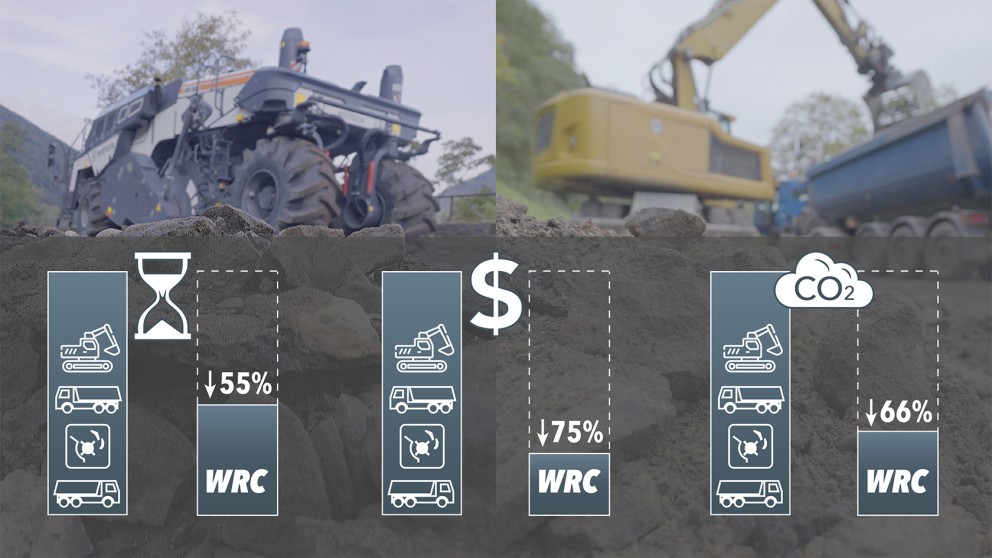- Working width:
- 2.32 m
- Working depth:
- 35 cm
- Screen mesh size:
- 45 mm
- Average advance rate:
- 7 m/min


On-site crushing, mixing and screening
The L98, a two-lane country road, closely follows the course of the river Moselle in the shadow of the medieval castle Burg Metternich. The road is an essential part of this economic region’s infrastructure that must be kept in good condition. In the area around the municipality of Beilstein, a section of the road with a length of almost three kilometres was in need of structural rehabilitation. After milling off the asphalt surface layer, the remainder of the asphalt binder course and the underlying hand-packed stone layer were crushed and processed in situ in a single pass by a WRC 240i Rock Crusher from Wirtgen. The aim of this was the creation of a new, homogeneous base layer that would provide enduring resistance to the axle loads of future heavy traffic.
Hand-packed stone layers such as on the L98, or base layers containing large pieces of stone, as often used in the past, mean that traditional rehabilitation can be extremely laborious, and that conventional processing is particularly time consuming and costly. Above all the transportation of material takes time and is expensive. With the WRC 240i Rock Crusher, Wirtgen offers a considerably more economical solution and a real alternative for the realisation of this challenging task. The productivity, the achievable working depth and the quality of the material produced by the WRC are currently unique on the market.
The crushing and mixing rotor of the WRC 240i processed the existing binder course and the underlying hand-packed stone layer with its HT18 crushing tools to a depth of 35 cm. In the crushing process, the variable and fixed crushing stages ensured that the pieces of stone were fragmented piece by piece to the required size by impact crushing. The screen unit with a mesh size of 45 mm in the rear part of the crushing and mixing chamber determined the fragment size of the crushed material. In this way, a new, high-quality homogeneously mixed base layer was created in situ in accordance with the project specifications to a working depth of 35 cm.
With a working width of 2.32 m and an advance rate of around 7 m/min, the machine achieved a material crushing rate of 600 tonnes of per hour. On the project site, the total volume of material produced on site by the Wirtgen Rock Crusher amounted to around 11,900 t and eliminated the need for transporting approximately 1,200 truckloads of processed or new material to and from the construction site. After compaction, the new crushed stone base layer was ready for the placement of the overlying asphalt binder course and the paving of the asphalt surface layer.
The use of the Wirtgen Rock Crusher significantly reduced not only the transport costs, but also the overall CO₂ emissions. In this case, the CO₂ emissions were cut by around 66 per cent. The construction costs for the creation of an unbound, homogeneous base layer were reduced by 75 per cent and the project completion time was shortened by 55 per cent. This meant that the section of the L98 was ready for asphalt paving within only two days and was very soon able to be opened to traffic again.
Shown here in blue: the 20,000 m² recycled section of the L98 along the Moselle river.

Press/media kit
Click here to download a ZIP file containing the press release in the available languages in Microsoft Word format and the images in 300 dpi resolution.
Download
